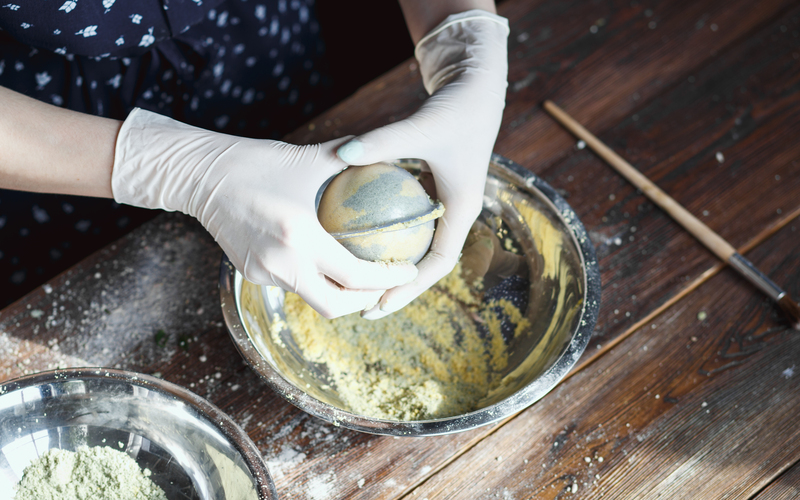Radiant Results: Mastering Jewellery Cleaning
Posted on 29/06/2025
Radiant Results: Mastering Jewellery Cleaning
Jewellery is far more than ornamental; it's an expression of personality, a symbol of cherished moments, and in many cases, a valuable investment. Over time, the brilliance of your favourite rings, necklaces, and bracelets can dull due to exposure to everyday elements. Mastering jewellery cleaning ensures your treasured pieces remain as stunning as the memories they commemorate. This comprehensive guide will teach you how to achieve radiant results every time you refresh your collection.
Why is Jewellery Cleaning Essential?
From the gentle shimmer of silver to the captivating sparkle of gemstones, keeping jewellery clean is crucial for more than just aesthetics. Here's why regular jewellery cleaning matters:
- Preserves Shine and Brilliance: Cleaning removes the layers of grime, lotions, and skin oils that dull your jewellery's sparkle.
- Prevents Damage: Dirt buildup can scratch soft stones and metals, while corrosive substances can weaken structural integrity.
- Maintains Value: Well-maintained pieces hold their value better--important for heirlooms and investments.
- Hygiene: Rings and bracelets, especially, come into contact with skin, soap, and bacteria daily. Cleaning helps you stay healthy.

Common Reasons Jewellery Loses its Lustre
To master the art of jewellery cleaning, understanding the causes of tarnish and dullness is essential. The most common offenders include:
- Skin Oils and Sweat: Everyday wear leaves oils and sweat on metal and stones.
- Cosmetics and Lotions: Creams, perfumes, and hairspray can create a filmy residue.
- Moisture: Humidity and water exposure (swimming pools, showers) accelerate tarnish and corrosion, especially for silver and costume pieces.
- Dust and Dirt: Accumulated in crevices, especially in intricate settings.
- Natural Tarnishing: Especially prominent in sterling silver, due to chemical reaction with air and pollutants.
Understanding Your Jewellery Materials
Not every piece can be cleaned the same way. Being aware of your jewellery's materials is fundamental for radiant cleaning results:
Gold Jewellery
Gold is relatively soft and resistant to tarnish but can scratch or deform. Pure gold (24k) is less common in daily wear due to its softness; most gold jewellery is alloyed for durability (e.g., 18k, 14k).
Silver Jewellery
Silver tarnishes rapidly when exposed to air or sulfuric compounds. Sterling silver (92.5% silver) is most common and needs regular, gentle cleaning.
Platinum and White Gold
These precious metals are durable but can collect scratches over time. White gold usually has a rhodium plating, which can wear off.
Gemstones
Different gems require different care:
- Hard Stones: Diamonds, rubies, and sapphires are durable but can loosen from settings over time.
- Soft Stones: Opals, pearls, turquoise, and emeralds scratch easily and can be damaged by harsh chemicals or ultrasonic cleaners.
- Porous Gems: Pearls and amber absorb liquids, so keep them away from water and perfumes.
Costume and Plated Jewellery
These pieces have thin layers of gold or silver over base metals or are made of non-precious materials. Vigorous cleaning or soaking can strip away the finish.
Essential Tools for Jewellery Cleaning
Before you begin your routine of professional jewellery cleaning at home, gather these must-have tools:
- Soft, lint-free cloths - For gentle buffing and drying.
- Small, soft-bristled brush - An old baby toothbrush works wonders for intricate settings.
- Bowl of clean, lukewarm water
- Mild dish soap
- Jewellery cleaning solution (optional) - Specially formulated products available for gold, silver, or gemstone jewellery.
- Non-abrasive polishing cloth - Especially recommended for silver items.
Step-by-Step Guide: Cleaning Jewellery at Home
Achieving radiant results with jewellery cleaning doesn't require professional skills--just a bit of care and attention. Here's a tried-and-true routine:
1. Inspect Your Jewellery
Before starting, examine each piece carefully. Look for loose stones, worn prongs, or any damage. Set aside items that may require professional repair or cleaning.
2. Prepare a Cleaning Solution
In a bowl, mix a small amount of mild liquid dish soap with lukewarm water. Avoid harsh detergents, bleach, or ammonia unless recommended for specific items.
3. Soak Jewellery Carefully
Place jewellery in the solution for 10-15 minutes. This loosens grime and residue. Avoid soaking pearls, opals, or glued-in stones to prevent damage.
4. Gently Brush Away Dirt
Use a clean, soft-bristle toothbrush to work around stone settings and engravings. Apply light pressure to avoid scratches.
5. Rinse and Dry Thoroughly
Rinse each piece under lukewarm running water. Hold securely over a strainer or closed drain to avoid accidental loss. Dry with a soft, lint-free cloth; let pieces air-dry completely before storing.
6. Buff to Shine
Use a jewellery polishing cloth to restore brilliance, especially on silver or gold. Do not use abrasive materials or paper towels, as they can scratch surfaces.
The Best Techniques for Each Jewellery Type
Let's break down jewellery cleaning tips by type for optimal, radiant results:
Gold Jewellery Cleaning
- Mix a few drops of dish soap with warm water.
- Soak pieces for 10-20 minutes.
- Gently brush with a soft toothbrush, especially under prongs and in settings.
- Rinse thoroughly and dry with a cloth.
Tip: For stubborn spots, make a paste of baking soda and water, apply gently, then rinse completely.
Silver Jewellery Cleaning
- Use a silver-polishing cloth for daily touch-ups.
- For deep cleaning, line a bowl with aluminium foil, add hot water, a tablespoon of baking soda, and a pinch of salt. Let silver soak, then rinse and dry.
Do not use abrasive scrubs. Tarnished silver should never be cleaned with toothpaste--it scratches!
Diamond and Gemstone Jewellery Cleaning
- Use warm, soapy water and a soft brush for most precious stones.
- For diamonds, occasional use of a non-abrasive commercial cleaner is safe.
- Rinse thoroughly and dry well to avoid water spots.
Warning: Emeralds, opals, turquoise, and pearls require even gentler treatment--just wipe with a damp cloth, and never soak.
Costume Jewellery Cleaning
- Avoid submerging in water, as it can loosen glue or damage settings.
- Dab a cloth in soapy water, wipe gently, and dry promptly.
Jewellery Cleaning Mistakes to Avoid
Even the most careful cleaner can fall prey to these common errors, which can ruin your radiant jewellery:
- Using Harsh Chemicals: Bleach, chlorine, and ammonia can irreparably damage both metal and gems.
- Excessive Scrubbing: Overbrushing can loosen prongs or scratch stones.
- Soaking Porous Stones: Never soak pearls, opals, amber, or glued-in stones.
- Ultrasonic Cleaners on Soft/Paste Stones: These machines can dislodge fragile gems; use only on hard gems and metals.
- Incorrect Storage After Cleaning: Putting away damp jewellery invites tarnish and mold growth.
Professional Jewellery Cleaning Options
While at-home jewellery cleaning works for regular maintenance, some situations call for professional expertise:
- Heavily Tarnished Pieces: Jewelers have ultrasonic cleaners and steamers for deep cleaning.
- Complex or Antique Jewellery: Special care is needed to preserve structure and patina.
- Resizing, Prong Straightening, and Repairs: Always consult an expert.
Many jewelers offer complimentary cleaning with inspections, especially for engagement rings and other precious items.
How to Store Jewellery for Lasting Radiance
After achieving a perfect clean, storing your jewellery properly will protect all your efforts:
- Keep separate - Store different types and metals apart to prevent scratches and tarnishing.
- Use anti-tarnish strips or pouches for silver items.
- Secure settings - Avoid tossing pieces into one container. Use padded boxes or soft bags.
- Store in a cool, dry location away from direct sunlight and humidity.
Natural Methods for Jewellery Cleaning
You don't always need commercial cleaners--many household items can safely restore shine when used properly:
- Baking soda paste for gold (not gemstones or silver with an oxidised finish).
- Aluminium foil and baking soda bath for tarnished silver.
- White vinegar for gold and silver (avoid on fragile stones).
Always spot test a discreet area first, and avoid these methods if your jewellery is vintage or contains glued stones.
Expert Tips for Sparkling Jewellery
- Remove rings when using hand cream, cooking, or gardening.
- Pearl necklaces should be strung regularly and knotted to avoid stone loss.
- Wipe down items with a jewellery cloth after each wear to delay tarnish and buildup.
- Have your settings checked annually by a jeweller--especially for engagement and wedding bands.

FAQs: Jewellery Cleaning and Maintenance
How often should I clean my jewellery?
Most pieces worn daily benefit from a gentle cleaning once a month, while less-used items need a refresh every 3-6 months. Wiping with a soft cloth after each wear prevents major buildup.
How do I clean vintage or antique jewellery?
Antique pieces are often delicate, with patinas that should be preserved. Avoid harsh chemicals, and use only a dampened cloth and soft brush. When in doubt, seek a professional with restoration experience.
Can I use toothpaste to clean silver or diamonds?
Despite its popularity, toothpaste is abrasive and can scratch metals and stones. Use non-abrasive jewellery cleaning products or designated polishing cloths instead.
Is ultrasonic cleaning safe for my jewellery?
Ultrasonic cleaners are effective for gold, platinum, and diamonds but can dislodge stones or crack softer gems like opals and emeralds. Consult your jeweller before using this method at home.
Conclusion: Radiant Results Every Time
Caring for your jewellery ensures it continues to dazzle for a lifetime. From mastering jewellery cleaning routines at home to knowing when to visit a professional, the right techniques protect both sentiment and sparkle. With a regular commitment to cleanliness and smart storage, your jewellery will remain a radiant highlight for every occasion.
Remember, every piece tells a story--keep yours glittering, brilliant, and beautiful.





